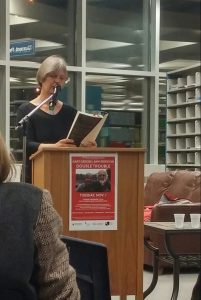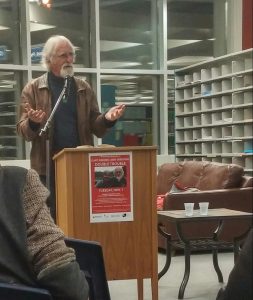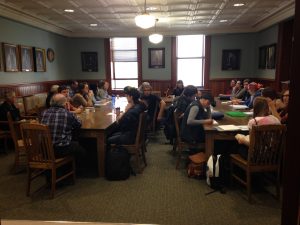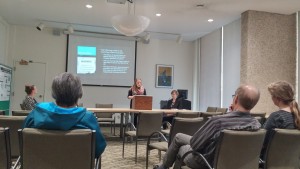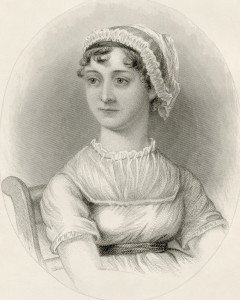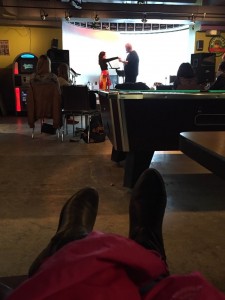2016 news
November 2016
English Faculty among those honoured in the Arts Research Celebration

Take a look at the first row–all members of the Department of English and Creative Writing. For the full story, click on the image.
Gary Geddes and Ann Eriksson bring Double Trouble to BU
Ann Eriksson and Gary Geddes are both launching books this year–she a novel, and he a book of poetry. On their cross-country reading tour, they stopped in Brandon to read from their new works. Ann’s new novel addresses poverty and privilege in New York, and Gary’s new poetry deals with the harsh realities of one of Canada’s worst residential schools. Their readings were bold, beautiful, and moving. After the reading, Ann, Gary, and the audience had a lively discussion about cultural appropriation, theory versus creativity, persona, and the life of a writer. The two authors came to BU as part of the Hawkweed Literary Forum.
October 2016
English prof among those honoured at BU’s celebration of research
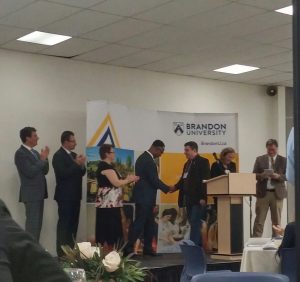
Brandon University has had unprecedented success in tri-agency funding this year, and BU hosted a party to celebrate! Amongst those honoured was Dr. Jonathan Allan, one of the faculty members of the English and Creative Writing Department.
Dr. Allan was awarded $27,917 for his project entitled, Discursive Analysis of Circumcision and Masculinity.
Project Description: The debates over “to circumcise or not” are so complicated and so vexed that one hardly knows where to begin. As such, this project asks: what are the secular reasons to circumcise?
Four BU alumni share their wisdom about graduate school
Deanna Smid
Have you ever thought about pursuing a Master’s or PhD in English or Creative Writing? Four BU alumni–Neal Hackler, Trent Gill, Lesley Glendinning, and Brandy Robertson–did more than think about it: they all went to various graduate schools and were awarded a Master’s or PhD. The four graciously agreed to speak about their experiences at a “grad school round-table discussion” organized by the English and Creative Writing Club. Each spoke about their positive and negative experiences, providing first-hand accounts of the collegiality and competition of grad school. All of the speakers advised BU students to start planning early: gathering reference letters, applying for lucrative financial grants, etc., all takes time.
Members of the English and CW club were generous enough to provide snacks for the event. In fact, I was so excited about the delicious treats that I forgot to take a picture of our speakers, and I only photographed the snacks. Yes, shameful, I know. Even worse, I didn’t include the delicious cookies and coffee that graced the snack table, too. But here it is: a snack photo:
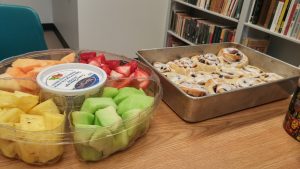
University of Manitoba Hosts Student Journalism Conference
Nathan MacKrith, Reporter
On October 15th there was a student journalist conference held at the University of Manitoba. The Manitoba Student Journalism Conference was organized by the Manitoba, one of U of M’s student newspapers. This was the first time this particular event has ever taken place. I was one of the three Quill members fortunate enough to be able to attend.
The day-long conference went from 9:30 AM until 4:30 PM. Among the topics covered were: how to produce clean copy, dealing with communications people, How to file a FIPPA (Freedom of Information and Protection of Privacy Act) request, ways to interview people, and more. I could not go to every session because sometimes there were two running simultaneously.
In the session on how to deal with communications people I learned how to scrum. In Canada the scrum is a daily ritual at Parliament. Members of the press surround politicians as they exit the chamber of the House of Commons. The reason the scrum is a favoured media interview tactic is because of its ability to draw out impromptu and controversial remarks. An example of one such comment is “just watch me” which was spewed at journalists from the mouth of former Canadian Prime Minister Pierre Trudeau.
In the session on filing FIPPA requests, I learned about what a FIPPA is. According to the gov.mb.ca, FIPPA provides “a right of access to records held by public bodies.”
I found the sessions to be informative and full of great insight. I feel that I gained some valuable knowledge and useful skills in the world of journalism. I would highly recommend that anyone interested in journalism considers attending next year’s conference.
September 2016
Sargent & Victor & Me
By Nathan MacKrith
Winnipeg playwright, director, and actor Debbie Patterson was in Brandon last week to give a talk at Brandon University and to perform her one person play Sargent & Victor & Me. Patterons’s talk, “Writing from the Body: Disability, Art, and the Physical Nature of Theatre” took place on Tuesday September 27th in Clark Hall Room 104, and focused on her own personal experiences as an actor and artist living with Multiple Sclerosis. She spoke on the kinds of challenges she faces daily and how she has been and continues to learn how to learn how to overcome them through creativity and ingenuity. Patterson’s talk was part of the continuing Brandon University Faulty of Arts Speakers Series.
Patterson’s play Sargent & Victor & Me was performed on Wednesday September 28th and Thursday September 29th at the Park Community Center. Debbie Patterson was brought to Brandon University with support from the Dean of Arts, the Rowe Fund, the Department of English and Creative Writing, and the Hawkweed Literary Forum.
(Excerpted from The Quill, Issue 5, Volume 107)
Hawkweed Literary Forum: Paul Dutton
By Nathan MacKrith
On Tuesday, September 27th, Toronto-born sound poet, writer and musician Paul Dutton was at Brandon University. He had a 1:40 pm reading in the BU Library’s Gathering Space, followed by at 3:00 pm Sound 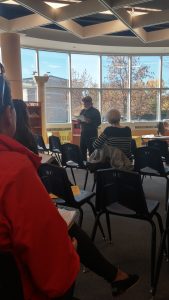 Art Master Class in the Elephant Room of the Knowles-Douglas Center. Dutton was brought to Brandon University by the Hawkweed Literary Forum.
Art Master Class in the Elephant Room of the Knowles-Douglas Center. Dutton was brought to Brandon University by the Hawkweed Literary Forum.
The Sound Art Masterclass was an occasion which escapes being fully described by words. Any attempts to do so by this Quill reporter, who was in attendance, would result in amphiboly. However, what can be said is that it was a transcendental experience. Led by Dutton, the group was encouraged to let loose and explore the summits and nethermost regions of human vocality. The Paul Dutton Experience, as I am dubbing it, was one worth having, and what I learned there will have lasting effects on me that I will not forget any time soon.
(Excerpted from The Quill, Issue 5, Volume 107)
Richard Van Camp reads at BU
On September 26, acclaimed Canadian author, Richard Van Camp, delighted his BU audience by sharing excerpts from his works, as part of the Thin Air 2016 Winnipeg International Writers Festival. What follow is the perspective of one student–Shawna Harding– on his reading:
Richard Van Camp is a Canadian author from the Northwest Territories. He has a wide range of writing styles including novels, children stories and even comic books. By using these different writing styles, Van Camp is better able to convey specific messages to his audience. For example, Van Camp wanted to  write something to deter youth from violence and gangs: he said he could have easily done a pamphlet but wanted to appeal to his target audience and show more emotion for such an important topic. This is why he chose to write a comic book. In his comic Path of the Warrior he gives some insight as to why people join gangs and the destruction they cause to communities. His other comic, Kiss me deadly explores the important issues of sexual health, especially in remote areas, like the NWT where there are limited resources and privacy. I think Van Camp does a great job at showing awareness and educate the reader on such important topics by using his writing in a non-conventional way. Within these comics he is able to evoke a strong emotional response within a short period of time. Not only are these important topics written in a way directed at the youth, he also tried to create a comic for everyone, including women. His effort to include all genders in his comic books is refreshing as they are typically directed toward men. A common inspiration in Van Camp’s writing is writing from heart break. These stories are inspired by heart breaking situations which is why they deserve so much awareness.
write something to deter youth from violence and gangs: he said he could have easily done a pamphlet but wanted to appeal to his target audience and show more emotion for such an important topic. This is why he chose to write a comic book. In his comic Path of the Warrior he gives some insight as to why people join gangs and the destruction they cause to communities. His other comic, Kiss me deadly explores the important issues of sexual health, especially in remote areas, like the NWT where there are limited resources and privacy. I think Van Camp does a great job at showing awareness and educate the reader on such important topics by using his writing in a non-conventional way. Within these comics he is able to evoke a strong emotional response within a short period of time. Not only are these important topics written in a way directed at the youth, he also tried to create a comic for everyone, including women. His effort to include all genders in his comic books is refreshing as they are typically directed toward men. A common inspiration in Van Camp’s writing is writing from heart break. These stories are inspired by heart breaking situations which is why they deserve so much awareness.
May 2016
Dr. Jonathan A. Allan launches Reading from Behind
At the University of Regina Press display at the 2016 Congress of the Humanities and Social Sciences, Dr. Allan launched his new book, Reading from Behind: A Cultural Analysis of the Anus. Excerpted below are portions of the speech he read at the event:
“Reading from Behind is a short book on the role of the anus, the rear, the posterior, the behind, the bottom, the as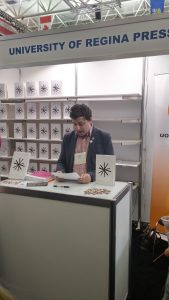 s in literary theory and cultural criticism. In this book, I had a basic hunch that the ass is more important than we have cared to admit, or than we have admitted, but only in part. In the book, I argued that the rear can help us to understand a wide range of textual expressions and that reading from behind can illuminate literary and cultural texts in new and exciting ways. However, to do this, we must also change our critical postures and anxieties and address what is arguably the most pressing issue: our discomfort with anal things, with other people’s asses, and with the fact that perhaps the ass is filled with meaning that we have not yet attended to for any number of reasons. It’s tricky, for despite the apparent discomfort with, and avoidance of, the anus, it fascinates us. In fact, Christina Garibaldi boldly writes for MTV News, “It’s pretty safe to say that 2014 will be remembered as the year of the booty.”
s in literary theory and cultural criticism. In this book, I had a basic hunch that the ass is more important than we have cared to admit, or than we have admitted, but only in part. In the book, I argued that the rear can help us to understand a wide range of textual expressions and that reading from behind can illuminate literary and cultural texts in new and exciting ways. However, to do this, we must also change our critical postures and anxieties and address what is arguably the most pressing issue: our discomfort with anal things, with other people’s asses, and with the fact that perhaps the ass is filled with meaning that we have not yet attended to for any number of reasons. It’s tricky, for despite the apparent discomfort with, and avoidance of, the anus, it fascinates us. In fact, Christina Garibaldi boldly writes for MTV News, “It’s pretty safe to say that 2014 will be remembered as the year of the booty.”
…
“When promoting the book, when the book was reviewed, I was struck by how often discussions focused on titillation, the juvenile, and laughter. A local radio-station tweeted: “Professor writes a book about ‘the cultural history of the anus.’ let the jokes fly…..go…..” The book was even nominated for the Diagram Prize, which awards the book with the “oddest title” the prize. Of course, I knew there would be some reaction (I didn’t imagine it would be so widespread), but there are, I contend, serious consequences to not taking the butt seriously. I admit wholeheartedly that the butt is laughable, even embarrassing. But what are the implications of this shamefulness on our engagement with, say, medical care?
…
Consider one example. Prostate Cancer Screening. While it may likely come as no surprise, especially given the number of jokes available in popular culture, it bears repeating: “Digital Rectal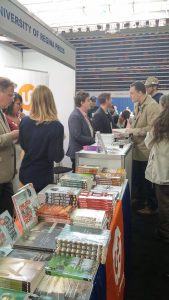 Examination is a significant barrier to participation in Prostate Cancer screening” (Naccarato, et al., 68). In one of the few articles to explore why this might be the case, the “barrier” is situated along the axis of masculinity and sexuality: “major barriers to having DRE among African American men relating to their discomfort, embarrassment, or the believe that the exam is associated with homosexuality” (Winterich 301). While this case study focuses chiefly on straight African American men, we must admit that these reactions are likely not unique to African American men, especially given, as I’ve noted, the numerous jokes about prostate exams in popular culture, that, speak to our deep cultural suspicious around masculinity and the anus. Simply put, the fear of the ass can be detrimental to men’s health.
Examination is a significant barrier to participation in Prostate Cancer screening” (Naccarato, et al., 68). In one of the few articles to explore why this might be the case, the “barrier” is situated along the axis of masculinity and sexuality: “major barriers to having DRE among African American men relating to their discomfort, embarrassment, or the believe that the exam is associated with homosexuality” (Winterich 301). While this case study focuses chiefly on straight African American men, we must admit that these reactions are likely not unique to African American men, especially given, as I’ve noted, the numerous jokes about prostate exams in popular culture, that, speak to our deep cultural suspicious around masculinity and the anus. Simply put, the fear of the ass can be detrimental to men’s health.
As much as Reading from Behind was a book devoted to questions of literary and cultural texts and their engagement with questions of masculinity, today, I cannot help but see how this book can participate in growing discussions around men’s sexuality and health care. Simply put, the butt is funny, but it is also deadly serious and we need to recognize these intersections.”
April 2016
They Sing to Us: Poems for Walking With Our Sisters
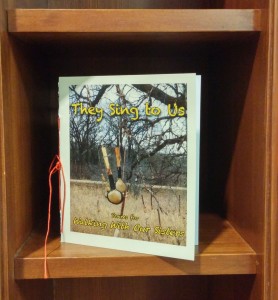
The moving, the unforgettable, Walking With Our Sisters, curated by Christi Belcourt and the National Organization of WWOS, was hosted at Brandon University from February 22 to March 6, 2016. To memorialize their responses to the art installation and to the Missing and Murdered Indigenous Women and Children of Canada and the USA, Professor Di Brandt and the students in her 30.353 Creative Writing: Poetry class have published an artistic chapbook of poems: The Sing to Us (Radish Press 2016).
The poems are a celebration, a memorial, and a call to action. The chapbook’s cover photograph features the work of another Brandon University professor, Peter Morin and some of his Aboriginal and Visual Arts students: because they are all somebodies daughter, an installation that premiered at the Art Gallery of Southwestern Manitoba in honour of Walking With Our Sisters last spring. The chapbooks are available for purchase at cost ($5) in the BU Faculty of Arts office (Clark Hall room 100). Currently, there is a limit of 5 copies per person, but if you wish to purchase a larger number, you can contact Di Brandt at brandtd@brandonu.ca.
Senior Colloquium: A Student’s (Literary) Perspective
Sarra Nazar
The Brandon University’s Senior Colloquium provided me with the unique opportunity to attend numerous presentations presented by senior level students across a variety of faculties. Most notably, I had the opportunity to attend the “Foodies” section with Jessica Fortier and Jemina Gwamna. Both presenters are completing a degree in Gender and Women Studies and focused on different gender based societal issues. Jessica Fortier focused on the impact of colonization on our modern diet and how anti-feminist factory farming culture led her to vegetarianism. Jemina Gwamna spoke about the anti-feminist views in the North American culture toward breast feeding, and how misinformation and lack of education has resulted in a society that sexualizes breasts.
These presentations led me to think about the variety of ways that gender and society influences not only the topics discussed, but also literature. Primarily, I was left reflecting on rest cures as discussed in “The Yellow Wallpaper” and the change that occurred as a result of this revolutionary piece of writing by Charlotte Perkins Gilman. Charlotte Perkins Gilman, a writer for social reform and American feminist shows the impact ones’ beliefs has in their writing. As a result of her literature she was able to cause social reform and helped eliminate the prescription of rest cures.
Introducing Dr. Robson’s newest course
In September 2016, Dr. Robson will be teaching her new course, “Jane Austen.” What is it all about?
- Why is Jane Austen so popular?
There are a lot of reasons probably, including her irony and her brilliantly nuanced way of exposing her world to critique. At the base of it, though, she’s just a lovely writer and storyteller. Her prose is so rich and smooth, and her narratives are well crafted, built around complex and primarily sympathetic characters whose lives are without a lot of action yet are full of meaning. Her novels challenge you without seeming to do so. They’re always a good read.
I actually find that my favorite will tend to change. For a long time it was Persuasion. It’s Austen’s last completed novel and the ideas are just so smooth and sleek, so polished. Lately, though, I’m tending to favor Northanger Abbey. The more I read it, the funnier it gets. Of course Austen is playing around with the Gothic form in this novel, so that element appeals to me as well.
- In one sentence, what do you hope students will learn in your course?
I hope they learn to appreciate the deftly subtle but bitingly insightful engagements Austen makes with the cultural concerns of her day. (One sentence: that’s a challenge!)
- Are you planning to watch Pride and Prejudice and Zombies?
Absolutely! I’m frustrated to say, though, that I missed seeing it when it recently passed through Brandon; it wasn’t here long at all. I plan to be fast with the Amazon purchase as soon as it comes out on DVD. The concept is a stroke of crazy brilliance and combines two of my favorite literary elements: Austen and horror narratives. It’s so very wrong that it’s perfect.
March 2016
Siren’s Song: A Spoken Word Event
On March 19th, 2016 I attended the poetry reading “Siren’s Song: A Spoken Word Event” that was put on by BU’s English and Creative Writing Club. As it was the first poetry reading I had ever been to, I had no idea what to expect and have no other readings to compare it to. The only thing I had to go off of was the stereotypical poetry reading found in movies or TV shows. Walking in to Suds I almost anticipated a crowd of hipsters in a dim lit room who snap instead of clap. This poetry reading was nothing like that, and I actually enjoyed it a lot more than I thought I would. There were four different poets who read multiple pieces of their own creation. We heard rants about the power of freedom, lyrical poems about black forest cake, poems demonstrating love for Canadian small towns, a young man impersonating an eagle and many more. It was incredible to hear these artists talked about their passions, lives, struggles and feelings in a way that incorporated humour, evoked emotion and created, well, in many cases confusion. Some of the poems were easy to comprehend and others left me thinking, “Wait…what?!?” as I struggled to understand what the poet was trying to say. I found the difficult poems harder to appreciate because only hearing them once was not enough to connect to them. Having a copy of the poems in a pamphlet might have been the one thing to improve the reading; it would be easier to follow along with a written copy or at least look back at it afterwards. I loved the poems that addressed issues that were easy to relate to, such as the ones about family and loss. A poem that was written by taking various lines from a number of 80’s songs to create a masterpiece about Billy Jean, a love shack and pouring some sugar on it was my favourite poem of the afternoon. Overall, the “Siren’s Song” poetry reading was a great experience and I might just have to attend another one.
Dr. Gasse publishes new book
Congratulations, Dr. Gasse, on publishing The Feral Piers: A Reader’s Experience of the British Library Cotton Caligula A XI Manuscript of Piers Plowman!
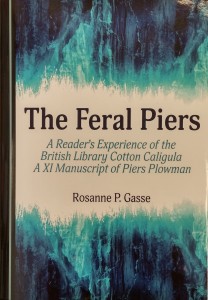 What do we mean when we talk about the text of Piers Plowman? What is the concept of a literary text when that construct exists in so many variant and feral forms, as is the case for the multiple modern editorial reconstructions and the more than fifty surviving manuscripts and early print editions of Piers Plowman? How do the anonymous roles of author, scribe, and reader intersect to create the experience of the text? How can we judge a pre-modern text’s reception history if we do not know exactly what it was that the early reader was responding to?
What do we mean when we talk about the text of Piers Plowman? What is the concept of a literary text when that construct exists in so many variant and feral forms, as is the case for the multiple modern editorial reconstructions and the more than fifty surviving manuscripts and early print editions of Piers Plowman? How do the anonymous roles of author, scribe, and reader intersect to create the experience of the text? How can we judge a pre-modern text’s reception history if we do not know exactly what it was that the early reader was responding to?
This book takes a daring and innovating approach to answering such questions as these. It is a micro-study of one particular historic version of Piers Plowman, its scribe, and its fifteenth and sixteenth-century readers: British Library Cotton Caligula A XI, a manuscript which combines the C, A, and B texts of the poem, and which was likely copied out in the first quarter of the fifteenth century. It reads the Cotton Piers not as an ossified relic whose value lies in what can be gleaned from it about modes of scribal production and Cot’s textual relationship to other Piers manuscripts, but as a living text meant to be experienced and enjoyed as a work of literature in its own right.
In gaining a better comprehension at the micro-level of this particular historic version, a better understanding of the whole concept of Piers Plowman itself emerges.
Women’s Week 2016
Congratulations to Louise Ferguson and Shaylyn White, two English and Creative Writing Students honoured during women’s week!
February 2016
Forget the wine and cheese! Bring on the beer and pizza!
The annual English and Creative Writing social has a new name: “Beer and Pizza” rather than “Wine and Cheese.” Honestly, it should have been called “Wine and Cheese and Beer and Pizza,” but we had to edit the name to fit the poster. Many students and faculty attended the party on February 25, which included good food, good drink, and great conversations. To add to the excitement, students won various door prizes, including a number of books, and an iTunes gift card. See you again at next year’s party!
I was so busy chatting that I forgot to take pictures during the party. So, here are two pictures of the aftermath:
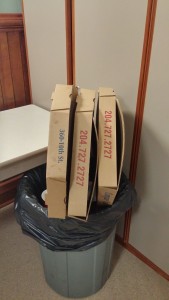
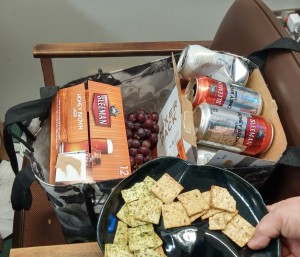
Playwright visits BU campus
Dale Lakevold
The Department of English & Creative Writing was pleased to host on February 11-12 a production of “Good People Bad Things,” a one-act monologue written and performed by Winnipeg-based Daniel Thau-Eleff. The play presents the story of a Jewish playwright activist who questions the integrity of his response to the Israeli-Palestinian conflict. In his journey of discovery, he comes to understand the responsibilities that we have to others, especially to the oppressed and to those in crisis.

Following each performance at the Evans Theatre, Daniel fielded questions and comments from the audience. The two lively sessions were moderated by Dr. Burcu Yaman Ntelioglou in Education and Prof. Dale Lakevold in English & Creative Writing. BU Creative Arts student Nathan MacKrith served both as stage manager and as sound and light tech, while Dakota Bicklmeier, also in Creative Arts, designed the poster for the production.
The performance on Feb. 11 brought together the classes of Prof. James Forsythe’s Theatre Design 30:356 and Prof. Lakevold’s Introduction to Canadian Literature 30:162. The performance on Feb. 12 was presented as part of the Faculty of Arts Speaker Series for 2015-16.
Earlier in the week, on Feb. 8, Daniel treated Brandon and area to a public workshop on the art of personal narrative. Workshop participants included students from two BU classes: Dr. Ntelioglou’s Teaching Drama 02:324 and Prof. Lakevold’s Short Story Sequence 30:355.
On Feb. 11, Daniel delivered a Theatre for Living workshop in Prof. Forsythe’s Introduction to Theatre II 20:164. The Theatre for Living method developed by Canadian David Diamond and Headlines Theatre is a form of popular theatre that engages participants in addressing and politicizing community-specific subjects and issues.
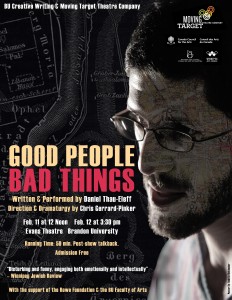 Daniel Thau-Eleff is the artistic producer of the Moving Target Theatre Company. His plays include Deserter, My Affair with George Bernard, King’s Park, and Remember the Night. He has worked as an actor for the Royal Manitoba Theatre Centre and Prairie Theatre Exchange, and as a stage manager for Shakespeare in the Ruins and Manitoba Association of Playwrights. He is a graduate of the theatre program at the University of Winnipeg (2003). “Good People Bad Things” has been performed across Canada in Charlottetown, Halifax, Kitchener/Waterloo, Toronto, Vancouver, and Winnipeg. After the Brandon performance, it moved to Winnipeg for a Theatre Projects Manitoba show at the Times Changed Club.
Daniel Thau-Eleff is the artistic producer of the Moving Target Theatre Company. His plays include Deserter, My Affair with George Bernard, King’s Park, and Remember the Night. He has worked as an actor for the Royal Manitoba Theatre Centre and Prairie Theatre Exchange, and as a stage manager for Shakespeare in the Ruins and Manitoba Association of Playwrights. He is a graduate of the theatre program at the University of Winnipeg (2003). “Good People Bad Things” has been performed across Canada in Charlottetown, Halifax, Kitchener/Waterloo, Toronto, Vancouver, and Winnipeg. After the Brandon performance, it moved to Winnipeg for a Theatre Projects Manitoba show at the Times Changed Club.
The production and workshops were supported by the Rowe Foundation, the Department of English & Creative Writing, the Dean of Arts Dr. Demetres Tryphonopolous, and the Faculty of Arts Speaker Series.
January 2016
Dr. Rei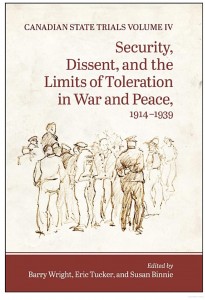 nhold Kramer publishes vital, local research
nhold Kramer publishes vital, local research
Together with Tom Mitchell, Dr. Kramer has published a chapter entitled, “Daniel de Leon Drew up the Diagram: Winnipeg’s Seditious-Conspiracy Trials of 1919–20,” included in Security, Dissent and the Limits of Toleration in War and Peace, 1914–1939. The chapter analyzes the nature of the trials following Winnipeg’s general strike. See the full story here.
BU hosts prestigious literary scholar
On January 26, 2016, BU was honoured to host Dr. J. Edward Chamberlin, University Professor Emeritus of English and Comparative Literature at the University of Toronto. His speech, organized by the Faculty of Arts Speaker Series, was well-attended and highly stimulating. ““You Should Have Been There”: The Conversation Between Print and Performance” brought together such disciplines as literary criticism, linguistics, and anthropology to analyze the (fraught) relationship between language as print and language as spoken word, story, ceremony. If you missed it, you should have been there! (Or you can read some of Dr. Chamberlin’s many bestselling books).
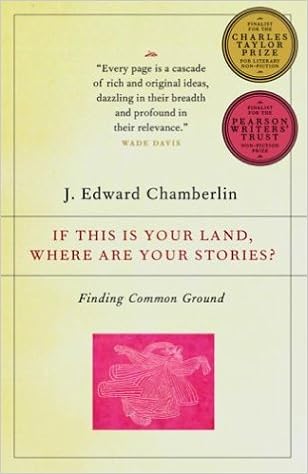
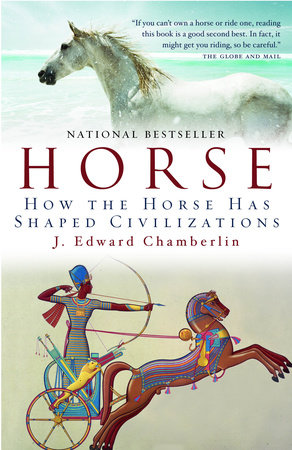

Telling It Like It Is
Nathan MacKrith
From January 5th to 11th, 2016, I had the pleasure of attending the CUP NASH 78 conference. CUP NASH is an annual student journalism conference organized by Canadian University Press. This year the conference was held at the Sheraton Hotel in Toronto, Canada.
Generally sessions were an hour long and they ran from 10 am until 5pm with a one hour break for lunch. One of the sessions I found to be the most interesting was the session on how to report properly on Indigenous issues. I learned what terms to use to identify the different Indigenous groups, and techniques on how to properly engage with and report on the various Indigenous communities of Canada. Another session I really enjoyed was on virtual reality’s role in journalism. We were shown several examples of stereoscopic journalism done on the Paris vigil of November 2015 and the most recently noted Ebola outbreak in 2015. I also found the sessions on how to write feature stories and ways to find a career in journalism very helpful and informative. I mainly write features for the Quill, and I was partly going to the conference to explore the possibilities available in the world of journalism. I also had the chance to meet many wonderful journalists from across the country.
All things considered I believe that my trip to NASH 78 was a worthwhile venture. I gained new knowledge and laid the foundations for what may become lasting contacts and relationships in the journalism community.
Dr. J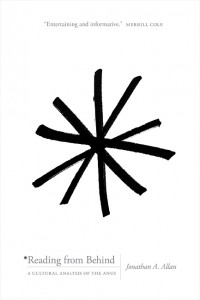 onathan A. Allan’s forthcoming book receives advanced praise
onathan A. Allan’s forthcoming book receives advanced praise
Dr. Allan’s new book, Reading from Behind: A Cultural Analysis of the Anus, is already receiving critical acclaim. The book, published by University of Regina Press, will be published on March 4, 2016, but it has already been named one of the “Sixteen for ’16” by a prominent literary blogger. See the full story here.

